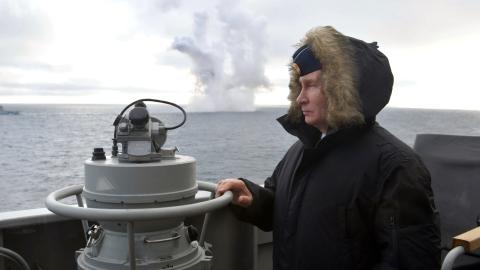Executive Summary
Many consider the Black Sea region to have been mostly peaceful since the collapse of the Soviet Union and the Warsaw Pact in 1991 until 2014, but the reality is more complex. While the sea itself may have been largely free and open during the 1990s and 2000s, Russia interfered regularly in the broader region during that time, making Ukraine its main target as Moscow sought to retain control over former Soviet territory in the aftermath of Ukraine’s 1991 independence. The Kremlin also interfered in Transnistria (1992), Abkhazia (1992–94), and Georgia (2008)—all of which are on or close to the Black Sea.
Russia and the BSR Russian President Vladimir Putin’s obsession with the Russkiy Mir and Novorossiya, revanchist names for the southern regions of the former Russian Empire to the north of the Black Sea, has driven Moscow’s focus on the BSR to unprecedented levels. In the service of this obsession, the Kremlin has torn up multiple treaties, flaunted international law and bilateral and multilateral agreements, rewritten history, weathered international ostracism, faced an arrest warrant for Putin from the International Criminal Court, and imposed untold hardships and tragedies on the Ukrainian and Russian people.
The Kremlin shows no intention of abandoning its goals of subsuming Ukraine within Russia and dictating developments in the BSR. Control of Crimea and the Black Sea littoral is essential to achieving these objectives. Moscow views the Black Sea region in zero-sum terms: what Russia can control or deny, others cannot.
Unstable, Contested Space
The BSR will remain an unstable and contested space until Russia is defeated or accepts the status quo ante before 2014, or until both Moscow and Kyiv reach a mutually acceptable agreement. Russia’s illegal seizure of most of Ukraine’s exclusive economic zone (EEZ) has shifted Russian territorial waters close to Romania’s maritime border, while Moscow’s attacks against Ukrainian ports on adjacent Romanian territory. Its threats against peaceful maritime activity have triggered food insecurity and spikes in global commodities prices, caused conflicts in the European Union agricultural sector and it has interfered in the Romanian and Bulgarian EEZs. Russia will continue to challenge the interests of Black Sea littoral and NATO states for as long as those states and the international community permit it.
To that end, the Kremlin has regularly declared exclusion zones for military exercises in the northern half of the Black Sea and closed off areas of the sea for weeks and months at a time. Since 2014, Russia on multiple occasions has declared close to half of the Black Sea surface off-limits to commercial traffic. If the international community acquiesces to these actions, it risks normalizing Moscow’s efforts to restrict freedom of navigation.
A Critical Geopolitical Node
In its March 31, 2023, Foreign Policy Concept, the Kremlin delivered the clear message that it intends to dominate its neighbors, is fighting the West, and is seeking to change the global order. The United States needs to continue to prioritize countering Russian actions in the Black Sea region and elsewhere, even as it recognizes communist China as the more serious long-term threat.
The Black Sea has become increasingly important over the last decade as Moscow has sought to expand its borders and forged ever closer relations with China, Iran, and other dictatorships. As Beijing expands its influence in the Middle Corridor—a trade route encompassing Central Asia, the Caucasus nations, and the Caspian Sea—its objective of replacing US and Western influence there has become ever clearer.
The balance of power in Europe affects the distribution of influence in the Middle East, the Indo-Pacific, and beyond. These regions meet in the Black Sea, making it a critical geopolitical node for Eurasia, which itself spans the broader maritime space that includes the Levantine Basin, the Red Sea, and the western Indian Ocean.
The BSR has always been a nodal point and transit route. Today it remains a bridge for facilitating connections between Europe and Eurasia via the Middle Corridor, critical infrastructure like oil and gas pipelines and fiber optic cables, and trade in resources like coal, metals, and cotton. It is also where the forces of democracy to the west, the Russian military to the north, Chinese economic influence to the east, and Middle Eastern instability to the south converge. With Europe’s center of gravity moving eastward, littoral states have become more important for the rest of the continent. As the aggressive, revisionist powers of Eurasia seek to expand their influence, a free and open Black Sea is firmly in the US national interest.
US Policy
Beginning in the early 2000s, successive US administrations, NATO leaders, and the EU and its member states failed to pay close attention or respond in a sustained manner to warning signs in the region. This signaled to Moscow that the area was of merely peripheral interest to the United States and Europe. Geography—the United States is half a world away from the Black Sea—and the strictures of the Montreux Convention also benefited the Kremlin. Despite continued US engagement, a sense pervaded the region that it was low on Washington’s list of priorities.
Russia’s full-scale invasion of Ukraine in February 2022 moved the BSR up that list. While the Biden administration repeatedly declined to transfer long-range missiles and other high-impact, precision weapons platforms to Kyiv, US support helped Ukraine slow Russian advances and regain occupied territory. NATO’s July 2022 Summit Communiqué demonstrated renewed focus on the region, and the alliance began to decrease the disparity in resources it had allocated to the northeast and southeast sectors of its eastern front. Washington also increased its assistance to Romania and Bulgaria.
The Black Sea Strategy that US Assistant Secretary for European and Eurasian Affairs James O’Brien presented to Congress on October 25, 2023, stressed that the fate of the region is inextricably linked to that of Ukraine and wider Europe. However, his was a State Department message that lacked the imprimatur of the entire US government, and its exhortations were too modest and too late. Its recommendations also relied too heavily on descriptions of well-known issues, came with few additional resources, and failed to provide a clear roadmap for implementation.
The December 2023 National Defense Authorization Act (NDAA) took a major step forward, stressing the need to halt the spread of Russian aggression in Europe, recognizing the BSR as a target of the Kremlin, and describing regional littoral states as crucial members of NATO. The NDAA characterized Russian attempts to use the Black Sea to control access to the Mediterranean as a threat to the United States and NATO and noted the importance of strengthening economic ties with the nations of the BSR. It also tasked the Biden administration with developing a whole-of-government strategy for the region in 2024.
The Militarization of the Black Sea Region
Since Russia’s illegal occupation of Crimea in February 2014, Moscow has transformed the peninsula into a formidable military stronghold. This expands its influence over more of the Black Sea through its missile, air, and naval forces and extends its military and strategic resources across more of Europe, the Mediterranean, and the Middle East. Russia’s simultaneous occupation and annexation of the territorial waters and EEZ surrounding the peninsula have also been significant, giving Moscow control over a substantial portion of the sea and allowing it to establish a comprehensive anti-access and area denial (A2/ AD) zone in the region.
The Battle for the Black Sea Is Not Over
Over the last year, and especially since autumn 2023, Ukraine has scored major successes in the maritime domain, sinking or disabling some 30 percent of Russia’s Black Sea Fleet (BSF). This success has fed the narrative that Kyiv is winning the battle of the Black Sea. The BSF is indeed increasingly vulnerable, and Russia is on the defensive on the water. It has relocated major naval assets away from Crimea, forces that are now only partially deployable, and even its hardware in Novorossiysk is vulnerable. The BSF no longer operates in the northwest of the Black Sea. This development challenges narratives that the war is a stalemate and that Russian victory is inevitable, and demonstrates that the war remains dynamic and that Ukraine can inflict major damage on Russian forces.
Yet it is far too early to declare that Ukraine has won the battle at sea. Kyiv’s clear maritime successes have not restored the Black Sea to anything resembling the status quo ante before 2014. Russia remains strong in the land and air domains and is hardly powerless in the maritime domain.
This war will be won or lost on land and in the air. As long as Moscow occupies Crimea and the Donbas, it has a platform from which to project its malign influence across Ukraine and beyond. This represents a serious long-term threat to Ukraine’s survival, to the Black Sea as a free and open body of water, and to the entire Black Sea region.
While Ukraine’s access to the global commons and international markets continues, it remains hostage to the Kremlin. Ukrainian ports and shipping remain vulnerable, which complicates and reduces commercial flows; while a grain corridor allowing Ukraine to export its most valuable commodity is currently operating close to the western Black Sea coast, Moscow can disrupt it at will, should it choose to do so. The Black Sea also contains many thousands of naval mines, both anchored and drifting.
Plausible Scenarios for the Evolution of the War in Ukraine
Three scenarios remain plausible as future trajectories of the war, each carrying varying levels of probability and divergent consequences for Ukraine and the West.
Scenario 1: Increased probability of a frozen conflict—mixed consequences
A freeze in the conflict appears to be the most likely scenario at this point in its evolution. Some countries are reducing their support for Ukraine even as others increase theirs. Western support may ebb if Russia advances further in 2024 or if domestic political support for Ukraine erodes further in the United States.
Scenario 2: Medium probability of a partial Russian victory, with Russia at the mouth of the Danube—very negative consequences
The probability of this scenario is directly correlated to whether Western support for Ukraine continues, increases, or declines. For this outcome to occur, the Kremlin would need to conquer Ukraine’s entire Black Sea littoral. If Putin is unable to make large-scale conquests in the first half of 2024, he will likely continue fighting a war of attrition, depleting Ukraine’s resources and wagering that Russia has the manpower to continue for longer than Ukraine can.
Scenario 3: Medium probability of Ukraine’s victory and liberation of Russian-occupied territories—positive consequences
A Ukrainian victory remains possible but is decreasingly probable as Western support erodes, Kyiv struggles with manpower and other shortages, and Putin doubles down on his goal of erasing Ukraine from the map. A Ukrainian victory would increase the likelihood of its accession to the EU and NATO and of the reconstruction of the country. Russia cannot begin the long process of expunging, and healing from, its neo-imperial mentality unless and until it loses the war.
A Worst-Case Scenario
Russia cannot be a reliable partner for the global West until it departs Ukraine, drops its territorial demands on neighbors, and allows the Black Sea region to return to the status quo ante before 2014. The United States has a clear interest in the BSR as whole, free, open, and at peace. This is also critical for Ukraine’s survival and for the prosperity of all littoral states.
While Ukraine continues to fight, envisioning a Russian victory— clearly the worst-case outcome of the war—remains an exercise in speculation. It is clearly up to Kyiv to define the conditions under which it decides to cease fighting.
Observers argue that Russia has already lost this war no matter its outcome. Ukraine has humiliated Moscow on the battlefield. The war has clarified the relationship between Moscow and Kyiv and solidified Ukraine’s national identity. Russia has become further dependent on China. NATO is more united than ever and has granted membership to formerly neutral Finland and Sweden. Putin is a war criminal with a warrant for his arrest from the International Criminal Court. Europe has significantly decreased its energy dependence on Russia.
Vladimir Putin and the Kremlin, however, do not view the world in these terms. If the guns fall silent and Russia holds territory it did not occupy before 2014, Putin will declare victory. The view from Red Square is that Moscow controls 17 to 19 percent of Ukraine—significantly more than it did before 2014 or 2022. The Russian army remains on the offensive, and it can determine, if not dictate, the terms for ending the war. Putin is still in power. That Moscow sees the war in these terms has geopolitical and other consequences for the United States.
The Impact on US Interests A consolidation of Russian control over the Ukrainian littoral would have a major negative impact on NATO allies, partners, and friends. It would leave the Kremlin in possession of highly strategic territory that it would no doubt weaponize to exercise inordinate influence over the region. It would entrench the militarization of the Black Sea and increase the likelihood of future conflict, at a cost to the United States.
Moscow still harbors ambitions of taking the entirety of Ukraine’s Black Sea coast. Retaining Crimea will enable the Kremlin to expand its malign influence over the BSR, Southeastern Europe, the Western Balkans, the Levant and broader Middle East, the eastern Mediterranean, and beyond.
Energy resources in the Black Sea region have the potential to be a game changer for Europe’s energy security. But if Putin wins, the development of these untapped assets is much less likely. The region is also important as an energy crossroads for Central Asia, the Caspian Sea, and the Middle East.
A Russian victory would also have negative consequences for the most acute long-term threat the United States and the global West face: the Chinese Communist Party (CCP). CCP leaders are watching the United States and its allies closely for signs of resolve, resilience, social cohesion, and military and financial strength. Should Russia win in Ukraine, China would likely conclude that the United States is unable to oppose its efforts to shape an alternative world order. Iran and its proxies would be emboldened to sow chaos across the Middle East. Pyongyang would feel freer to act on the Korean peninsula. Dictators, autocrats, and fence-sitters around the world would accommodate themselves to this new reality.
Principles Also Matter
The United States has a major interest in the preservation of the post–Cold War security system, which has fostered unprecedented peace and prosperity for the transatlantic community and beyond. Russia seeks to shatter the principles that undergird this US-led system.
The United States, therefore, also has a vested interest in demonstrating that Moscow’s brazen violation of the rules-based international order cannot stand, that internationally recognized borders are inviolable, and that independent countries cannot be extinguished.
The Kremlin should not be permitted to trample on international laws and norms. By invading Ukraine, Russia violated the 1945 United Nations Charter, the 1975 Helsinki Accords, the 1991 Belovezha Accords, the 1994 Budapest Memorandum, the 1998 Russia–Ukraine Friendship Treaty, and the 2010 Kharkiv Pact, not to mention the laws of war and international humanitarian law. Russia has also violated international treaties and rulings relating to the BSR: the 1997 Black Sea Fleet Treaty and the December 2003 Russian-Ukrainian Treaty on the Legal Status of the Sea of Azov and the Kerch Strait.
The exclusive economic zones of NATO member states are not, strictly speaking, covered by Article 5 of the Washington Treaty. However, Russian encroachments into these areas clearly obstruct free and open navigation. Russia has also not formally declared war on Ukraine, usually referring to its invasion as a special military operation—although some Russians use the term “war”—to avoid having the law of war and international humanitarian law apply to its behavior.
A Plan of Action
A more stable security environment in the Black Sea region requires strengthening Ukraine’s deterrent and destroying, damaging, or neutralizing Russia’s military infrastructure and ground lines of communication (GLOC) in Crimea. If the Kremlin can supply and use Crimea as a platform to prosecute its war, threaten attacks, and disrupt the region, the BSR will not resemble its pre-2014 state. Ukraine’s allies should do more to ensure Russia does not win this war. The Biden administration, for one, should speed the flow of weapons to Kyiv so that Ukraine can end the fighting on terms as favorable to its interests as possible.
For specific recommendations on the political, diplomatic, military, and economic elements of a whole-of-government United States strategy for the Black Sea region, please see page 79.






















